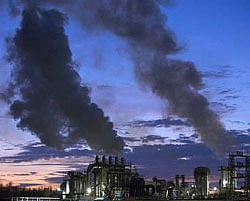Investors give cautious thumbs up to climate deal

The private sector is expected to supply most capital to drive a global shift to a greener economy away from burning fossil fuels.
Businesses and in particular the energy sector say they need clear carbon targets so that they can invest appropriately -- for example in power plants which may last for more than 40 years.
The world's biggest carbon emitters agreed on Friday in the Danish capital that the world should limit warming to no more than 2 degrees Celsius, and raise $100 billion annually by 2020 to help developing countries fight climate change.
Business analysts applauded how the agreement involved the major economies for the first time in making commitments to curb emissions -- cementing a global shift to a low-carbon world.
The present Kyoto Protocol only binds industrialised countries, with the exception of the United States.
"The implications for investment flows is very clear, we're irreversibly on a low-carbon path," said Abyd Karmali, head of emissions trading at Bank of America Merrill Lynch.
"That should give comfort to people who are investing in low-carbon technology."
"For the first time you've got all the major economies making real commitments to reducing their emissions," said Mark Kenber, policy director at the Climate Group.
"While expectations were low for a binding agreement to come out of Copenhagen, today's deal marks a promising milestone by major countries coming together to form an agreement," said Amit Chatterjee, CEO and founder of environmental software company Hara.
But the new agreement was not legally binding, and left unclear the status of any future agreement.
"Businesses will now look to national governments to put their pledges into law to give them the certainty to invest in a low-carbon future," said Kenber.
"I think business will be happy with the content but will want it put in national law and international treaty."
CARBON MARKET
Friday's agreement said that global warming should be limited to 2 degrees, but its pledges wouldn't deliver that commitment, European Union negotiators said.
Strong carbon cuts drive demand for emissions permits -- the currency of carbon markets.
Friday's agreement was just enough to drive continuing demand for such permits, and healthy carbon prices, analysts said. "It's just enough ambition to develop an adequate carbon price," said Kenber.
But the accord wasn't ambitious enough to persuade the European Union to increase its carbon cutting target to a 30 percent cut by 2020 versus 1990 levels from a 20 percent cut.
Strong carbon commitments discourage energy companies from emitting greenhouse gases, for example from burning coal in power plants.
"This allows us to fight another day," said Steve Sawyer, Secretary-General of the Global Wind Energy Council, responding to the Copenhagen Accord.
"It doesn't say how it would facilitate private financing under the agreement. It may alter the landscape, but not in a way we can quantify at this time."
And the deal was too vague to assure continuation of trade in carbon emissions permits between countries -- where rich nations pay for carbon cuts in developing countries and get carbon offsets in return.
"Business has been looking for more clarity on climate policy and carbon pricing but it hasn't got it from Copenhagen," said Jonathan Grant, from financial advisory firm PwC.
Carbon offsets, also called certified emissions reductions (CERs), are traded under a Kyoto Protocol scheme called the clean development mechanism (CDM).
"For the CER market there's much more uncertainty given the question marks over the reform of CDM. It's not mentioned in this text," said Karmali, referring to the Copenhagen Accord.
However the United States has given strong support for carbon offsets in draft climate bills, he added, giving some assurance to the future of those markets.
Deccan Herald is on WhatsApp Channels| Join now for Breaking News & Editor's Picks